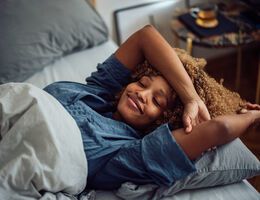Health library
Back to health libraryHow to sleep better

May 6, 2024—Feeling like you need a nap? You're not alone. Most Americans could use more sleep—not just tonight, but most nights. If you're one of them, that could be a problem for your physical and mental health.
Sleep deficiency is common
A December 2023 Gallup poll found that, among U.S. adults:
- 57% don't get the sleep they need.
- 42% do get enough sleep.
- Only 36% of women report getting adequate sleep, compared with 48% of men.
- Women between the ages of 18 and 49 are the least likely to get enough sleep. Only 27% of younger women get enough sleep, compared with 46% of men in the same age group.
These results reveal an alarming trend. When the same poll was conducted in 2013, 56% of American adults reported getting enough sleep, while just 43% said they did not.
Sleep's role in good health
Getting enough sleep doesn't just make you feel good; it plays a key role in maintaining health. According to the National Heart, Lung, and Blood Institute, sleep deficiency—a chronic lack of quality sleep—can interfere with your daily life, your health and your mood. People who don't get enough sleep may:
- Be less able to concentrate at work, at school or behind the wheel.
- Have trouble focusing, learning and remembering.
- Feel grumpy and less able to function in social situations.
- Have an increased risk of accidents, such as car accidents, and injuries.
And that's not all. The Centers for Disease Control and Prevention says sleep deficiency could put you at a higher risk for serious health problems, such as obesity, type 2 diabetes, heart disease and stroke. It also has a negative effect on your mental health.
Get better ZZZs
Improving your sleep quality takes time and effort, but it's well worth it. Getting a good night's sleep starts with healthy habits long before bedtime.
During the day:
- Get outdoors, especially in the morning.
- Cut out caffeine after 2 p.m.
- Make physical activity a part of your day—but make sure your workout ends a few hours before bedtime.
- If you must nap, keep it to 20 minutes or less, and don't nap after 3 p.m.
At night:
- Eliminate noise as much as you can.
- Darken your bedroom with light-blocking curtains.
- Keep the room temperature between 65 and 68 degrees.
- Go to bed at the same time every night, even on the weekends.
- Avoid caffeine, heavy meals and alcohol before bed.
- Stay away from screens—such as your TV, phone, computer or tablet—before bed.
Still feeling tired? If you have trouble sleeping or think you may have a sleep disorder, ask your doctor if it's time for a sleep study.
Sources
- American Cancer Society. "10 Tips to Get More Sleep." https://www.cancer.org/cancer/latest-news/how-to-get-more-sleep.html.
- Centers for Disease Control and Prevention. "Are You Getting Enough Sleep?" https://www.cdc.gov/sleep/features/getting-enough-sleep.html.
- Gallup. "Americans Sleeping Less, More Stressed." https://news.gallup.com/poll/642704/americans-sleeping-less-stressed.aspx.
- National Heart, Lung, and Blood Institute. "What Are Sleep Deprivation and Deficiency?" https://www.nhlbi.nih.gov/health/sleep-deprivation.
- Office of Disease Prevention and Health Promotion. "Get Enough Sleep." https://health.gov/myhealthfinder/healthy-living/mental-health-and-relationships/get-enough-sleep.
- Sleep Foundation. "20 Tips for How to Sleep Better." https://www.sleepfoundation.org/sleep-hygiene/healthy-sleep-tips.
